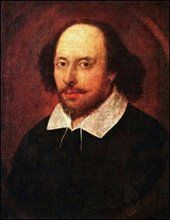
Henry V on horseback
Schema: SAT – remember to work on vocabulary. Try to learn a few new words every day. Write down the words you do not know from the SAT question and learn them.
We reviewed Henry’s speeches in front of Harfleur. In the first one, he is a great, motivational leader. In the second speech, he is brutal and cruel. It shows the harsh side of Henry. However, it also shows his leadership; he makes these brutal threats to save his men from having to fight and die. These are great examples of indirect characterization – we judge the character by his action and speech.
The Harfleur speeches also confirm Henry’s character type. He is a ‘round’ character; he is complex, contradictory and well developed. You like him and then are repelled by his actions. We also see the contradiction and complexity in his decision to hang his drinking buddy, Bardolph, for stealing a pax, a religious item (remember this); and in his brave response to the French, that his ransom will be his dead body. There is a dual purpose to Bardolph’s death: it continues the pattern of Henry rejecting bad influences from his past; and it shows that he is a good, fair leader, willing to punish all, even friends. The hanging reinforces the complex nature of Henry and his actions.
The scene with Princess Katherine is for comic relief, but it also foreshadows that Henry will prevail and she will marry him. As a result, she must learn English. As an aside, the film does a nice job in highlighting the transition with light and music.
We began to review Plot and plot elements. Plot is a causal sequence of events, draws us into character action and choice, and is the order of events. Keep in mind the difference between chronological order and ‘in medias res.’ There are four plot elements. Exposition is the basic information of the story. Complication is the catalyst for the major conflict. Climax is when the conflict is resolved. Resolution is the wrapping up of all the loose story elements.
The French Prince is called the Dauphin.
Homework: Read Act IV. Study for quiz tomorrow
No comments:
Post a Comment